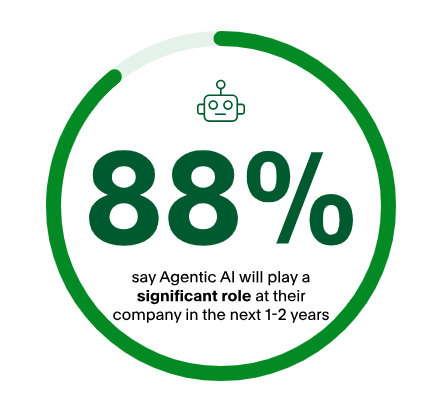
There is a clear divide emerging among today’s executives: The ones who are fully embracing AI are gaining a substantial competitive market advantage for their organizations, while also establishing themselves as the next generation of forward-thinking business leaders. These early adopting executives aren’t just experimenting with new tools, they’re reshaping their organizations from the inside out. By integrating AI into strategic decision-making, operations, and customer facing initiatives, they’re unlocking efficiencies, uncovering insights, and accelerating innovation at a pace that leaves other organizations scrambling to catch up.
In a recent survey of IT professionals, more than half of the respondents with the title of CIO or CTO believe agentic AI will be core to their operations within the next one to two years. Another 88% of these technology executives reported AI technology will play a “significant role” at their company.
As Vice President of Strategic Solutions & Alliances for a Contract AI platform, I’m blown away by the technology’s impact on our industry. Once seen as an experimental novelty, GenAI has quickly evolved into a powerful business solution, capable of transforming nearly every facet of an organization’s operations. From legal and sales to finance and procurement, companies are measuring both the quantitative and qualitative impacts these technologies have on their business.
The emergence of agentic AI takes this transformation a step further. These systems are not only capable of analyzing complex conditions, but can also design automated workflows and deliver autonomous actions to meet defined objectives. The range of potential applications, even within a single industry, is staggering. Early adopters are demonstrating just how profoundly this technology is reshaping the way their businesses think, operate, and grow.
Agentic AI’s Early Adopters Are Quickly Gaining a Competitive Edge
It’s no surprise CIOs and CTOs are so bullish on agentic AI. As the champions of their organization’s technological functions, they have a front row seat to the technology’s capabilities. Some are already using it to build intelligent automations while also significantly streamlining operational costs.
A recent example is Uber Freight’s use of agentic AI to drive automation and tangible improvements to their logistics management. By continuously evaluating dynamic variables such as traffic patterns, weather conditions, and road infrastructure, the platform intelligently matches drivers with optimal load assignments. This adaptive routing has led to a 10% to 15% reduction in empty miles, directly translating to lower fuel consumption, decreased operational costs, and a measurable reduction in carbon emissions.
Complementing these logistics enhancements, Uber Freight has also deployed AI-powered customer service agents that have significantly improved responsiveness. On average, wait times have decreased from five minutes to 30 seconds. Uber is utilizing agentic AI to deliver both economic and environmental value at scale.
Another great example of agentic AI’s massive potential: Last year, GE Healthcare published an article about how it’s using the technology to address the healthcare industry’s top three challenges: data overload, care plan orchestration, and the fragmentation of the healthcare system. Healthcare data is growing at an unprecedented scale, set to surpass 2,300 exabytes by the end of this year. Despite the large amount of data available, the healthcare industry continues to leverage only a small portion of it. Healthcare companies that adopt agentic AI early are already seeing major improvements, many of which are directly impacting patients in a positive manner.
For example, the Mayo Clinic implemented an agentic AI solution that analyzes patient data, evaluates medical records, and references genetic markers to predict diseases before any symptoms appear. This approach has led to astounding results: 30% faster disease detection, reduced financial burdens for patients due to fewer medical tests, and overall improved patient survival rates.
Leadership Though Agentic AI’s Biggest Challenges
While the potential of agentic AI is extraordinary, it’s important for leaders to recognize that realizing its full value requires thoughtful planning and deliberate execution. The pressure on companies, especially publicly traded enterprises, to integrate AI into their operations is growing rapidly. Market dynamics are increasingly favoring organizations that have embraced AI, often rewarding them with stronger investor confidence and stock performance. As a result, the urgency to explore and adopt AI-driven strategies is becoming the top priority for many leadership teams.
A skilled enterprise leader needs to be able to balance the razor thin line between rapid AI development, while ensuring their solutions have appropriate governance, ethical models, and a true understanding of the human impact.
The most visionary and forward thinking leaders understand the critical importance of addressing the agentic AI + human-in-the loop approach. Although agentic AI is designed to act autonomously, in its current state, human oversight is vital to both mitigate risk and ensure outcomes align with organizational values and goals.
This collaboration between human judgment and machine intelligence fosters trust and allows businesses to make more informed, nuanced decisions. Furthermore, top industry leaders are establishing AI Ethical Use Councils, AI Governance Teams, and are openly communicating their AI strategies to address the wide range of legitimate ethical and security concerns. This transparency not only promotes trust, but also sets a standard for integrity and accountability in the evolving AI landscape.
This technology isn’t plug-and-play; it demands a strategic mindset and a commitment to responsible implementation. A strong data foundation is essential, as agentic AI systems rely on well-structured, reliable data to function effectively. Without clean data and robust governance frameworks, organizations risk repeating the early missteps of generative AI: flawed inputs that led to misleading or unusable outputs. Prioritizing data quality and data grounding efforts isn’t just good practice, it’s essential to unlocking AI’s true potential while minimizing the likelihood of hallucinations and errors.
Agentic AI is the Future of Business
Since the first release of ChatGPT, we’ve witnessed a remarkable acceleration in how businesses operate, first with generative AI and now with the rise of agentic AI. This technology is redefining the speed of enterprise business, streamlining operations faster than previously thought possible, and is enhancing productivity across functions while creating new sources of competitive advantage.
The pace of AI advancement is striking, yet perhaps the most important realization is that we are still at the very beginning of uncovering what’s truly possible. With so much uncharted territory ahead, it’s a moment that calls for both optimism and careful consideration as we navigate the opportunities that lie before us.
While the full scope of agentic AI’s impact is still unfolding, one thing is increasingly clear: the early adopters are gaining a measurable edge on their competitors and are being rewarded financially in their respective markets. Executives who hesitate to embrace the emerging technology will likely find themselves struggling to catch up in a world that’s already moved forward, while those who embrace the future are establishing themselves as the leaders of tomorrow.





